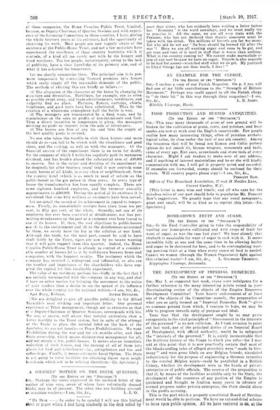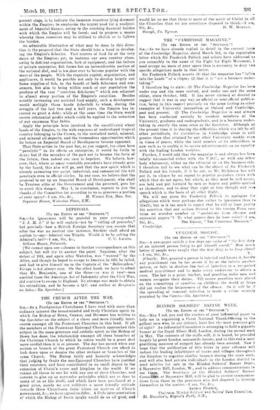THE DEVELOPMENT OF IMPERIAL RESOURCES. [TO THE EDITOR Or THE
" SPECTATOR."J SIR,—May I, as suggested last week, crave your indulgence for a further reference to the many interesting points raised in your discriminating review of the objects of the Empire Resources Development Committee? Your hearty endorsement of at least one of the objects of the Committee—namely, the preparation of what you so aptly termed an " Imperial Domesday Book "—gives us common ground from which, I venture to hope, we may be able to progress towards unity of put-peso and ideal.
Your fear that the development sought by us may prove antagonistic to the vital principle of " Government in the interests of the governed" is no new criticism. As I took occasion to point out last week, one of the principal duties of an Imperial Board of Development, with official authority, would be to safeguard the "interests of the governed." It is surely inconceivable that the fictitious history of the Congo to which you refer—for I may add at this point that it is now practically certain that most of the blood-curdling tales of alleged atrocities were " made in Ger- many" and were gross libels on our Belgian friends, circulated industriously for the purpose of engineering a German reversion to the coveted Belgian estate—could be paralleled in a British Colony, n-hether its development were in the hands of private enterprise or of public officials. The essence of the proposition is that if, by means of the facilities available only to the State, the development of the resources of any portion of the Empire is quickened and brought to fruition many years in advance of normal progress under private enterprise, the State should share in the profits accruing.
This is the part which a properly constituted Board of Develop- ment -would be able to perform. We have no cut-and-dried scheme to force upon public opinion, All re halo ventured to do. at the
present stage, is to indicate the immense resources lying dormant within the Empire; to emphasize the urgent need for a readjust- ment of Imperial finance, owing to the crushing financial burden with which the Empire will be faced; and to propose a means whereby those resources may be utilized to abolish or to lighten the burden.
An admirable illustration of what may be clone in this direc- tion is the proposal that the-State should take a hand in develop- ing the Empire's fisheries. Vast sources of focd lie at the very doors of the Empire; yet, to instance our own country alone, owing to deficient organization, lack of equipment, and the failure of private enterprise, fish forms but an inconsiderable portion of the national diet, and is too dear ever to become popular with the mass of the people. With the requisite capital, organization, and appliances, it would be possible not only to develop largely our home supplies of fish, to the benefit of both fishermen and con- sumers, but also to bring within reach of our population the produce of the vast " rent-free fish-farms " which are adjacent to almost every portion of the Empire's coast-line. Besides notably increasing our national food supply, such a development would multiply those hardy fisherfolk to whom, during the struggle of the last two and a half years, the Empire has in- curred so great a debt; while at the same time the State would secure substantial profits which could be applied to the reduction of our enormous War Debts.
Apply the principle hero involved to the uncultivated wheat lands of the Empire, to the wide expanses of undeveloped tropical country belonging to the Crown, to the unworked metal, mineral, and mineral oil deposits, and• the tremendous opportunities which lie before an Imperial Board of Development become apparent.
That State action in the past has, as you suggest, too often been "paralytic" in its effecta on enterprise, it would be futile to dory; but if the mistakes of the past are to become the facts of the future, then indeed our case is hopeless. We believe, how- ever, that, where so many venerable precedents have already gone by the board, this also will go, and that the new spirit which is already animating our social, industrial, and commercial life will penetrate even to official circles. In any case, we believe that the proposal to set up an Imperial Board of Devekpment, who shall be Trustees alike of the Government and the governed, goes far to avert this danger. May I, in conclusion, express to you the thanks of the Committee for according to us so generous a portion



































 Previous page
Previous page